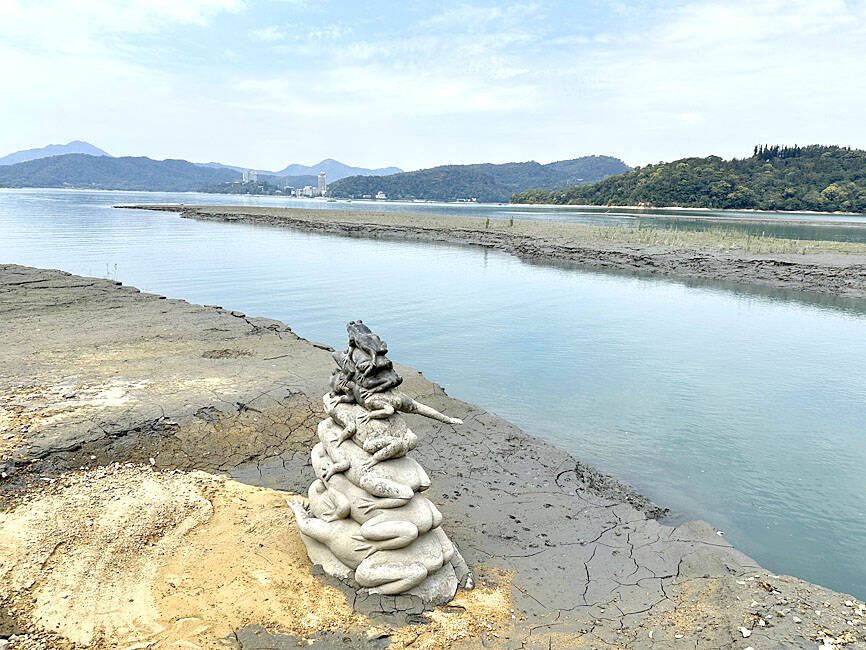Premier Chen Chien-jen (陳建仁) on Thursday called for tighter water conservation efforts following a report by the Water Resources Agency that the nation’s reservoirs only have a little more than three months’ supply of water.
Climate change research showed that Taiwan would experience longer periods without rain, although some downpours would be more intense, Executive Yuan spokesman Lin Tze-luen (林子倫) quoted Chen as saying after receiving the agency’s report at a Cabinet meeting.
The agency should continue its efforts to improve the water distribution network and develop more water supply sources, particularly in the western half of the country, Lin cited Chen as saying.

Photo courtesy of a reader
Agency data showed that agriculture typically accounts for about 70 percent of water usage in the nation, while domestic consumption accounts for 20 percent and industry 10 percent.
The volume of rainwater collected in reservoirs across the nation so far this year was only 30 to 60 percent of the typical average, the agency said.
Since October last year, the agency has been promoting mitigation measures, including more frequent cloud seeding and improved irrigation techniques, it said.
To date, the measures have saved about 840 million tonnes of water overall — equivalent to the capacity of four Shihmen Reservoirs (石門水庫) — and has helped the country through this year’s dry season, the report said.
Taiwan is now in the latter half of the dry season and has only about three months’ supply of water left in its reservoirs, it said.
However, given the uncertainty of spring rain patterns and the high demand for water during the heading stage of grain crops like rice, wheat and corn, water supply levels must be closely monitored, particularly at the Shimen, Baoshan (寶山), Yongheshan (永和山) and Liyutan (鯉魚潭) reservoirs in the north, the report said.
Currently, those reservoirs are at 30.7 percent, 33.29 percent, 56.82 percent and 35.23 percent of capacity respectively, agency data showed.
The agency earlier this month raised its drought monitoring signal for Taoyuan, Hsinchu, Miaoli and Taichung from a blue light to a green light, reminding people to conserve water.
Under the agency’s five color-based signals, blue signifies normal water supply, while green signals tight water supply. Yellow, orange and red indicate water shortages and a need for increasingly severe water rationing measures.

The first global hotel Keys Selection by the Michelin Guide includes four hotels in Taiwan, Michelin announced yesterday. All four received the “Michelin One Key,” indicating guests are to experience a “very special stay” at any of the locations as the establishments are “a true gem with personality. Service always goes the extra mile, and the hotel provides much more than others in its price range.” Of the four hotels, three are located in Taipei and one in Taichung. In Taipei, the One Key accolades were awarded to the Capella Taipei, Kimpton Da An Taipei and Mandarin Oriental Taipei. Capella Taipei was described by

The Taichung District Court yesterday confirmed its final ruling that the marriage between teenage heir Lai (賴) and a man surnamed Hsia (夏) was legally invalid, preventing Hsia from inheriting Lai’s NT$500 million (US$16.37 million) estate. The court confirmed that Hsia chose not to appeal the civil judgement after the court handed down its ruling in June, making the decision final. In the June ruling, the court said that Lai, 18, and Hsia, 26, showed “no mutual admiration before the marriage” and that their interactions were “distant and unfamiliar.” The judge concluded that the couple lacked the “true intention of

EVA Airways today confirmed the death of a flight attendant on Saturday upon their return to Taiwan and said an internal investigation has been launched, as criticism mounted over a social media post accusing the airline of failing to offer sufficient employee protections. According to the post, the flight attendant complained of feeling sick on board a flight, but was unable to take sick leave or access medical care. The crew member allegedly did not receive assistance from the chief purser, who failed to heed their requests for medical attention or call an ambulance once the flight landed, the post said. As sick

INDUSTRY: Beijing’s latest export measures go beyond targeting the US and would likely affect any country that uses Chinese rare earths or related tech, an academic said Taiwanese industries could face significant disruption from China’s newly tightened export controls on rare earth elements, as much of Taiwan’s supply indirectly depends on Chinese materials processed in Japan, a local expert said yesterday. Kristy Hsu (徐遵慈), director of the Taiwan ASEAN Studies Center at the Chung-Hua Institution for Economic Research, said that China’s latest export measures go far beyond targeting the US and would likely affect any country that uses Chinese rare earths or related technologies. With Japan and Southeast Asian countries among those expected to be hit, Taiwan could feel the impact through its reliance on Japanese-made semi-finished products and